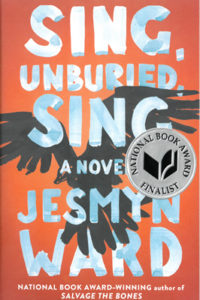
Meet National Book Award Finalist Jesmyn Ward
The author of Sing, Unburied, Sing on Prince, Faulkner, and writing exercises
The 2017 National Book Awards (also known as the Oscars of the literary world), will be held on November 15th in New York City. In preparation for the ceremony, and to celebrate all of the wonderful books and authors nominated for the awards this year, Literary Hub will be sharing short interviews with each of the finalists in all four categories: Young People’s Literature, Poetry, Nonfiction, and Fiction.
Jesmyn Ward’s Sing, Unburied, Sing (Scribner / Simon & Schuster) is a finalist for the 2017 National Book Award in Fiction. The novel centers on one complex family living on the Gulf Coast of Mississippi; when Leonie takes her children on a trip to pick up their father from prison, they encounter ghosts—their own, their family’s, America’s. Literary Hub asked Jesmyn a few questions about her new book, her favorite things, and her life as a writer.

What time of day do you write (and why)?
I do my best work at 6 am, early in the morning, before I wake my children and get them ready for school. I write early because I don’t get time otherwise.
How do you tackle writer’s block?
I use writing exercises to spark my creativity. I discovered Skeetah, China, and Big Henry from Salvage the Bones in a writing exercise. The Making of a Story by Alice Laplante has some really excellent exercises.
Which book(s) do you return to again and again?
As I Lay Dying by William Faulkner is a gorgeous, complicated book. It’s also short and powerful. If I had more time to read these days, my reply would be Absalom, Absalom!, which amazed me when I first read it. But I lack the time to focus on it because it’s longer and even more complicated than As I Lay Dying.
Which non-literary piece of culture—film, tv show, painting, song—could you not imagine your life without?
Prince’s oeuvre is life. I can’t imagine not being able to fall into his music. I miss him so much; the world was a brighter, freer place with him in it.
What’s the best writing advice you’ve ever received?
Read everything, and keep writing. If you give up, you’re removing your voice from the conversation. Persist!
This book is both a road trip novel and a ghost story and neither. How did you first envision it, and what changed during the writing?
When I began working on Sing, Unburied, Sing, I thought it was a road trip through the modern South. And then I began researching Parchman Prison, reading about the horrible history of the place, and found that Black children as young as 12 were sent to Parchman for committing petty crimes like vagrancy or loitering. There they were worked to exhaustion, beat, and sometimes died; in effect, they were re-enslaved. It was then I knew I had to write about a child like Richie, and I wanted that child to have the voice and agency that he was denied in life. The only way I could accomplish that was by making him a ghost.
Emily Temple
Emily Temple is the managing editor at Lit Hub. Her first novel, The Lightness, was published by William Morrow/HarperCollins in June 2020. You can buy it here.



















